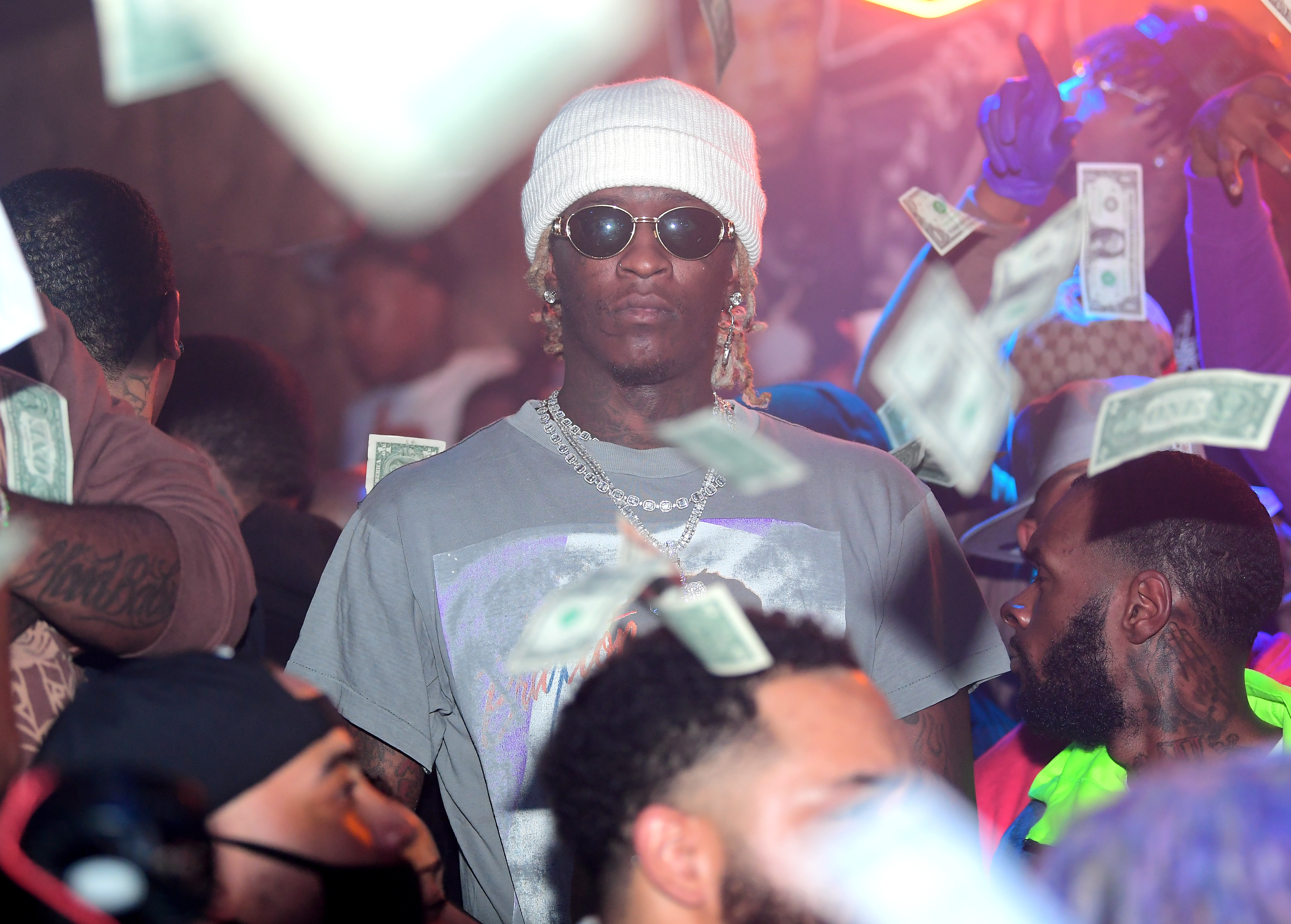‘Protect Black Art’: Movement Grows To End ‘Racial Double-Standard’ Of Using Rap Lyrics In Court

Source: (Photo by Prince Williams/Wireimage) / (Photo by Prince Williams/Wireimage)
300 Elektra Entertainment CEO Kevin Liles and Atlanta Music Group Chairman Julie Greenwald spearheaded the Protect Black Art movement earlier this year to limit how creative expression can be used against rappers and musicians on trial.
Their call for action comes at an unprecedented time for Hip-Hop. Several prosecutors across America have been using lyrical content against rappers in court as evidence. The case recently rang true for Young Thug and Gunna, who back in May, were indicted after lyrics from some of their popular song were used against them in an ongoing RICO Trial. The rappers are facing over 50 allegations that allege they were involved in street gang activity while performing under their label, YSL Records.
Protect Black Art Movement pens an open letter to legislators demanding change
Liles, Greenwald, and a number of prominent voices in the Hip-Hop community are working together with hopes of creating legislative change to stop the alarming trend. Earlier this year, the music execs launched a Change.Org petition, that garnered over 64,000 signatures. Now, they are taking things a step further.
On Tuesday, a number of artists, Hip-Hop industry leaders, and legal experts banned together to publish an open letter demanding for legislators across America to limit how lyrics can be used against defendants on trial. The letter, which was powered by the Protect Black Art community, Color of Change, and several organizations, also calls for legislation to end the racially targeted practice of using rap lyrics as confessions. Megan Thee Stallion, Drake, 2 Chainz, and Alicia Keys are some of the big names that have rallied in support of the urgent cause.
“Throughout history, artists have created characters and forged narratives that reflect the culture around them,” Julie Greenwald, Chairman & CEO of WMG’s Atlantic Music Group, said in a press release. “That freedom of expression is essential to the creative process and the role of art in society. The harsh reality is that Black artistic creativity is being threatened at an unprecedented level, and we must make every effort to stop this unethical, discriminatory approach to prosecution.”
What is the Rap Act Bill?
Leaders behind the Protect Black Art movement are now fighting for the passage of the Rap Act Bill. In July, Congressmen Hank Johnson and Jamaal Bowman introduced the Restoring Artistic Protection Act to protect artists from the wrongful use of their lyrics against them in criminal and civil proceedings. The legislation is the first bill of its kind at the federal level.
As of 2020, legal experts have found more than 500 cases involving rap as evidence in public records, and they believe there could be more cases that have gone uncovered. The eye-brow-raising number does not include indictment proceedings, juvenile cases, or cases that end in a plea bargain. In contrast, researchers have found only four instances since the 1950s of non-rap lyrics being submitted as evidence – three of those cases were thrown out, and the fourth was overturned after conviction, The New York Times noted.
In a statement, Congressman Jamaal Bowman referenced the case of 17-year-old Tommy Munsdwell Canady, who was charged with first-degree intentional homicide after prosecutors used lyrics from one of his songs to convict him of murder.
“Our judicial system disparately criminalizes Black and brown lives, including Black and brown creativity,” Congressman Bowman said. “Tommy Munsdwell Canady is a young 17-year-old kid serving a life sentence whose conviction heavily relied upon lyrics he wrote. I was deeply moved to hear that Mr. Canady continues to pursue his art in the face of our carceral systems that would otherwise stifle Black art.”
The politician continued, “He is not an outlier. Evidence shows when juries believe lyrics to be rap lyrics, there’s a tendency to presume it’s a confession, whereas lyrics for other genres of music are understood to be art, not factual reporting. This act would ensure that our evidentiary standards protect the First Amendment right to freedom of expression.”
Congressman Bowman and Johnson aren’t the only lawmakers leading the way for change in rap music.
More lawmakers are working to create change around the growing issue
In May, lawmakers in New York State passed Senate Bill S7527, or the “Rap Music on Trial Bill,” which will limit the admissibility of a defendant’s music or other forms of creative expression as evidence shown to a jury. If passed, the bill would require prosecutors to provide “clear and convincing evidence” that a defendant’s creative expression, such as a rap song, is “literal, rather than figurative or fictional.” But unfortunately, the bill wouldn’t place a total ban on prosecutors’ ability to present lyrics in a case.
Jay-Z and Meek Mill are some of the leading music industry giants advocating for the groundbreaking piece of legislation. Before it can be enacted into law, the bill must head to the New York State Assembly for approval.
In August, California Gov. Gavin Newsom landed a big win for creative expression when he signed the Decriminalizing Artistic Expression Act into law. The bill restricts the use of rap lyrics as evidence in court in California.
“For too long, prosecutors in California have used rap lyrics as a convenient way to inject racial bias and confusion into the criminal justice process,” said Dina LaPolt, entertainment attorney and co-founder of Songwriters of North America in a statement to Variety. “This legislation sets up important guardrails that will help courts hold prosecutors accountable and prevent them from criminalizing Black and Brown artistic expression. Thank you, Gov. Newsom, for setting the standard. We hope Congress will pass similar legislation, as this is a nationwide problem.”
SEE ALSO:
What Is The Rap Music On Trial Bill And Why Is It Important To Hip-Hop?
ACLU Of Georgia And Inner-City Muslim Action Network Explore ‘Rap On Trial’

The post ‘Protect Black Art’: Movement Grows To End ‘Racial Double-Standard’ Of Using Rap Lyrics In Court appeared first on NewsOne.


